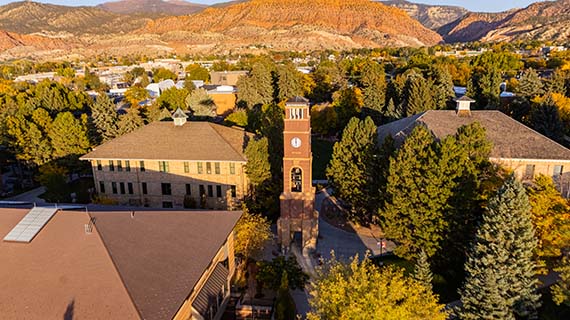University-Level Professional Learning Communities for Students
Published: November 10, 2020 | Author: Savannah Byers | Read Time: 3 minutes
 Living up to Southern Utah University’s motto, “Learning Lives Forever”, the College of Education and Human Development has recently begun exploring and developing university-level professional learning communities (PLCs) for students. PLCs are common in K-12 school districts for advancing pedagogy, research, and values in the field of education. SUU is currently one of the only universities exploring PLCs and preparing education majors and others for the PLCs they'll likely join or create in their future careers.
Living up to Southern Utah University’s motto, “Learning Lives Forever”, the College of Education and Human Development has recently begun exploring and developing university-level professional learning communities (PLCs) for students. PLCs are common in K-12 school districts for advancing pedagogy, research, and values in the field of education. SUU is currently one of the only universities exploring PLCs and preparing education majors and others for the PLCs they'll likely join or create in their future careers.
Dr. Brian Ludlow, associate professor of education, works closely with the Washington and Iron County School Districts. At the recommendation of multiple teachers and administrators, Dr. Ludlow began exploring PLCs at the university-level to help prepare his students for the PLCs in their careers.
“We want to prepare our students to join PLCs for when they become teachers,” said Dr. Ludlow. “PLCs allow communities of professionals to gather organically, to collaborate, and to solve problems. The whole idea behind PLCs is for teachers to see themselves as the professionals in the room, because they are.”
A PLC is not a committee as there are no official roles or hierarchy: PLCs are meant to be voluntary spaces to advance and explore different areas within the field of education.
Two months after beginning this endeavor, Dr. Ludlow teamed up with Dr. Joel Judd, associate professor of education and director of graduate studies in education. Dr. Judd has recently completed research on practitioner-based theses in SUU’s graduate education program. This new approach to research has a similar nature to the PLC environment. Not long after that they were joined by SUU professors John Meisner, Jen McKenzie, Tony Pellegrini, Betty Ann Rember, and Iron County District Administrator Steve Burton.
“PLC work goes hand in hand with practitioner research,” said Dr. Judd. “Practitioner research provides a framework for investigating problems that inevitably arise in school. But instead of relying exclusively on outside expertise to address local problems, PLC members investigate and answer questions about their work themselves.”
SUU’s first PLC met in February. The group had no goal, but they did have a shared interest in teacher education. After the COVID-19 pandemic hit in mid-March, the group had a topic and were able to set a goal. The PLC decided to research the impact of COVID-19 on teachers. They are currently in the process of surveying in-service teachers and compiling research.
The group’s goals shifted to diversity and social justice in May after the murder of George Floyd. After this shift, the group expanded to include individuals outside of the College of Education and Human Development (COEHD). After completing a book study for background research, the group’s goal was to write a statement for the COEHD website. The new statement can be found on the landing page for teacher education. It reads:
“The Teacher Education faculty at Southern Utah University decry inequity and injustice in our educational system and greater society. We commit to developing and nurturing educators who value all people in the communities they serve. Such professional educators will act as agents of change, advocate for equity and justice in their schools and communities, and will embolden students to do the same.”
The future of PLCs at SUU looks bright. There is always new research available in the field of education, and SUU is committed to preparing future educators to be effective practitioners.
“Our university is on the leading edge of PLCs at the university level,” said Dr. Ludlow. “In 5-7 years, SUU will be the best place to learn about university level PLCs.”
Get in touch with Dr. Ludlow to learn more about PLCs at SUU. SUU’s Center of Excellence for Teaching and Learning also offers learning communities for faculty.
Tags: Education
Contact Information
435-586-5400
Contact the Office of Marketing Communication
This article was published more than 3 years ago and might contain outdated information or broken links. As a result, its accuracy cannot be guaranteed.

